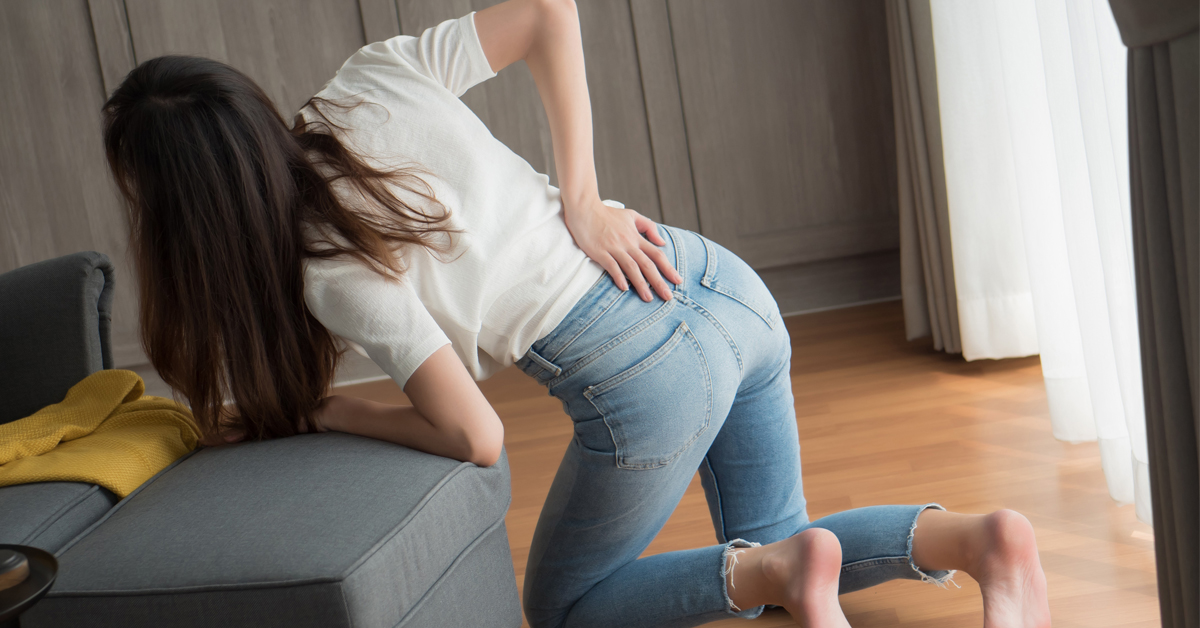Slipped Disc In Back? Symptoms You Should Know

Back pain can be a pain. And if you’ve ever experienced even minor back issues, you know how much it can interfere with your life. You may have heard about slipped discs from friends or family members, as it is very common. Here are the symptoms of a slipped disc in the back.
What Is a Disc?
When people say the word “disc” they are referring to intervertebral discs. These are sponge-like cushions in your spine that separate your spinal bones. Discs allow for these spinal bones, called vertebrae, to move freely without knocking into each other or breaking.
Discs are made up of an inner and outer layer. The outer layer is strong and surrounds and protects the inner gel-like layer of the disc.
What Is a Slipped Disc?
A slipped disc, known medically as a herniated disc, occurs when disc tissue pushes out, leading to discomfort and a range of other symptoms.
Usually, the disc’s outer layer breaks, allowing the inner gel to leak into the spinal region and causing pain and inflammation. Other times, the entire disc bulges out.
A slipped disc can occur anywhere along the spine but most commonly affects the lower back, known as the lumbar spine, and, to a lesser extent, the neck or cervical spine.
What Causes a Slipped Disc?
Slipped discs in the back can happen for a number of reasons, including:
- Aging: Over time, spinal discs naturally lose their flexibility and hydration. This dehydration makes the discs more brittle and susceptible to rupturing, even under minimal strain.
- Physical exertion: Engaging in activities that involve lifting heavy objects or making sudden, awkward movements can put excessive strain on the spine.
- Carrying excess body weight: Additional pressure on the spinal discs can accelerate disc degeneration and increase the likelihood of a disc slipping.
- Sedentary lifestyle: A lack of regular exercise weakens the muscles that support the spine, making your back more vulnerable to injuries.
- Direct physical impacts or injuries: Playing sports, accidents, or falls can cause immediate damage to the discs, leading to herniation.
What Are the Symptoms of a Slipped Disc in the Back?
If you have a slipped disc, you may wonder what a slipped disc feels like, notice some of the following symptoms:
- Pain and Numbness: You might feel this mostly on one side of your body. It could be a persistent pain that varies in intensity, often depending on your posture or activities.
- Radiating Pain: The pain might not stay put; it can travel to other parts of your body. If the slipped disc is in your neck, you might feel pain down your arms. If it is in your lower back, the pain might shoot down your legs.
- Pain When Moving: Certain actions, such as bending over, sitting for a while, or even quick movements like sneezing or coughing, might make the pain worse. This happens because these actions put extra pressure on the nerve where the disc is herniated.
- Muscle Weakness: The muscles that receive signals from the nerves affected by the herniated disc might start to weaken. This could make it challenging to lift things or might affect your grip.
- Tingling or Burning Sensations: Along with pain, you might feel a tingling or burning sensation in the area where the nerve is pinched. These sensations are your body telling you that the nerve is irritated or not functioning correctly.
Red Flag Symptoms
When it comes to disc pain, there are some signs you can’t ignore because they need immediate attention:
- Severe pain: If you’re experiencing pain that doesn’t get better with usual remedies like over-the-counter painkillers, rest, or ice, it’s important to take it seriously. Debilitating pain can be a clue that something more serious is going on and needs a medical diagnosis and treatment.
- Loss of bladder or bowel control: A sudden inability to control your bladder or bowel requires immediate medical care.
- Neurological changes: If you start to notice symptoms like increasing weakness, numbness, loss of coordination, or trouble walking, these are significant warning signs and need immediate medical evaluation.
When to See a Specialist
If you are experiencing significant back pain, it’s important to seek care for a proper diagnosis. Symptoms of a slipped disc can often be similar to those of other conditions. However, once diagnosed, not all slipped discs require extensive care. Many people find relief from noninvasive treatments such as gentle exercises, over-the-counter pain relief, and improved posture.
However, other people may require surgery like a microdiscectomy or a disc replacement.
If you are experiencing bothersome symptoms or suspect you have a slipped disc, don’t delay – schedule an appointment with an experienced neurosurgeon or physiatrist today!

